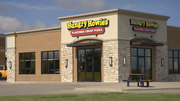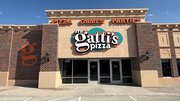Article
Sales falling at 70% of US restaurants
The restaurant industry is reeling, according to the most recent data collected by Black Box Intelligence, and unfortunately, that's expected to increase.

March 18, 2020 by S.A. Whitehead — Food Editor, Net World Media Group
The restaurant industry's pulse is quickening and fading as U.S. brands are forced to accommodate the "new normal" brought on by the spread of COVID-19. That's part of the take-away from the data and insights experts at Black Box Intelligence, who have been collecting daily restaurant sales and traffic data and making it available at no charge to restaurant operators.
Last Friday, the company surveyed 200 restaurant operators on the pandemic's impact, and as you might expect, the news was not good. Although most of it tracked sales and traffic for the March period before many chains ceased dine-in operations, almost 70% of restaurant companies reported decreased traffic, while limited-service brands suffered a 3.1% drop in comp traffic. But that was actually better than full-service brands, which saw their traffic falter 3.7% with 85% of operators reporting that traffic had slowed.
Blackbox said the biggest hits were in areas where outbreaks had intensified at that time, as well as tourist and convention destinations. In the center of the area with the most cases, initially — Seattle — comp traffic was three times worse than the national average, falling 10.4%.
There again, higher service-level dining concepts, like fine-dining and upscale casual were most affected and showed a 30% decline in traffic, Black Box Financial Intelligence data indicated. But even with that, the company said that upscale and fine-dining chains appeared to be adapting their operations to the current pandemic challenges better than other categories if guest feedback is any indication. In those sectors, guests expressed the most "positive sentiment" when they spoke of the "coronavirus."
Shifting to drive-thru, delivery-only brings challenges
CNBC reported that at least 19 states have restricted restaurant operations to drive-thru, carryout and/or delivery only. And some of the biggest players — McDonald's, Wendy's, Chick-fil-A, Dunkin' and Starbucks — reported earlier this week that they had closed all dine-in operations even in states that weren't requiring it.
"As restaurants shift to off-premise sales, third-party delivery may prove challenging given the very low adoption rates by consumers, especially those in older demographics," Black Box Intelligence said in its most recent report. "Only 4% of all consumers 18-24 years old placed a third-party delivery order the week ending 3/6; the percentage was less than 1% for those 55 and older."
The company also reported that consumers continued to move their spending from restaurants to grocery stores, lessoning their restaurant spend by 2.8% during the first week of March, including a drop of twice that much in the initial U.S. pandemic center of Seattle, where restaurant spend decreased 5.7%.
The crystal ball view
Many health experts in the U.S., said the restaurant industry's struggles have only just begun. Given that knowledge, it's not surprising that 60% of restaurants said they were working on contingency plans regarding the possibility of future store closures.
As brands stepped up in-store sanitation and instituted protocols for employees exposed to the virus, one-third of restaurants said they were experiencing staffing challenges due to the pandemic. Most brands said they have paid sick leave for managers, but not hourly employees, although some have announced changes to those policies with the pandemic.
Some light in this pandemic "tunnel" comes from restaurant performance during the first quarter in the U.S., before COVID-19 had really raised its ugly head in the States. Black Box said relatively nice weather across the U.S. at that time produced strong same-store sales growth results for the first months of the year, which it believed would "mask" some of the negative effects expected in year-over-year sales growth nationally.
The company said sharp drops were expected in the coming weeks, however, in areas where COVID-19 cases were numerous, like San Francisco, where sales were dropping, particularly in full-service dining. Nationally, the company said meaningful erosion in restaurant sales was probably a few weeks off. However, it said increased panic among consumers over the economy and availability of resources for their daily lives could cause that to shoot up more rapidly.
"The global slowdown in economic activity — which is causing many economists to revise down their growth estimates for 2020 — coupled with the possibility of the coronavirus outbreak directly hurting restaurants on a wider scale, present strong concerns in an industry that continues to struggle with declining guest counts," Black Box said in its report. "In this new landscape, flat same-store sales for the year may be the new best-case scenario and declining sales a likely outcome."
Read all coronavirus coverage on FastCasual.
About S.A. Whitehead
Pizza Marketplace and QSRweb editor Shelly Whitehead is a former newspaper and TV reporter with an affinity for telling stories about the people and innovative thinking behind great brands.
 ChatGPT
ChatGPT Grok
Grok Perplexity
Perplexity Claude
Claude








